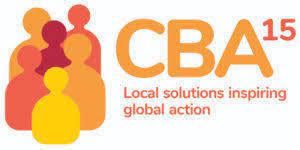CBA15: Local solutions inspiring global action – Talking Points

Introduction
The CBA15 online conference took place from 14-18th June 2021. Participants joined from over 70 countries to share their experiences from implementing adaptation projects, and to discuss new ideas and perspectives on how to amplify community adaptation priorities in international and national spaces.
Some key points regarding the conference are provided below.
For more details, download the article on the left.
Methods and Tools
The conference had five themes, each organised around one leading question:
- Climate finance: what does improved access to climate finance look like at the local level and what do different actors need to do to achieve the change we urgently need?
- Innovation for adaptation: how can we build partnerships that prioritise and sustain community-led innovation?
- Responsive policy: how can policy from local to global level be refocused so that it prioritises local action and local knowledge?
- Nature-based solutions for adaptation: how can local communities drive nature-based solutions for resilient food systems?
- Youth inclusion: how can we mainstream and scale up youth participation so that they can be equal and capable decision makers for community-based adaptation?
Several sessions engaged directly and indirectly with the Principles for Locally Led Adaptation — developed to ensure communities are empowered to lead local-level adaptation to climate change. Cross-cutting themes also included gender and monitoring, evaluation and learning (MEL).
Outcomes and Impacts
The key messages from the discussions are provided below:
- Changing the focus of the intermediaries: intermediaries need to step back from trying to be the decision makers and stop trying to be the bridge that links funding to communities and community institutions. Communities themselves need to develop direct access to the funds to have real power. Intermediaries can support communities to access funds more regularly and at greater volumes.
- Build the skills for monitoring, evaluation and learning:Done properly, MEL can facilitate accountability, innovation and learning from failure. Yet MEL remains chronically under-supported in practice, with many demanding support to build their skills.
- Funds should invest in understanding contexts and building trust:
- Donor commitment financing adaptation at scale is a necessary outcome from COP26. But more funding is not enough. Speakers and discussants called for longer funding cycles that incorporate time for implementers to undertake appropriate preparatory work.
- Close the gap:We must move beyond promising policy announcements to ensuring that they are translated into real outcomes that reduce vulnerability where it is experienced the most. It is time for those who have endorsed the locally led adaptation principles to review their own ways of working and ensure they are truly enabling communities to lead.
The links to videos and rapporteur notes from each session are available in the document.
Related resources
- Round-up of the 10th International Conference on Community-Based Adaptation to Climate Change (CBA10)
- Posters presented during the 9th International Conference on CBA
- Community Based Adaptation: Measuring and Enhancing Effective Adaptation
- Share your CBA8 case studies on weADAPT
- How to scale out community-based adaptation to climate change
- Adaptation, development and the community
- CBA15: Four messages ahead of COP26
(0) Comments
There is no content